《大学英语语法》课程电子教案(PPT课件)01 动词的语态
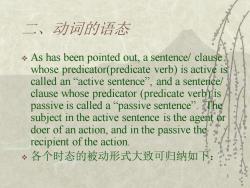
二、动词的语态 As has been pointed out,a sentence/clause. whose predicator(predicate verb)is active is called an "active sentence",and a sentence/ clause whose predicator (predicate verb)is passive is called a"passive sentence".The subject in the active sentence is the agent or doer of an action,and in the passive the.s recipient of the action. 。各个时态的被动形式大致可归纳如下:
1 二、动词的语态 ❖ As has been pointed out, a sentence/ clause whose predicator(predicate verb) is active is called an “active sentence”, and a sentence/ clause whose predicator (predicate verb) is passive is called a “passive sentence”. The subject in the active sentence is the agent or doer of an action, and in the passive the recipient of the action. ❖ 各个时态的被动形式大致可归纳如下:
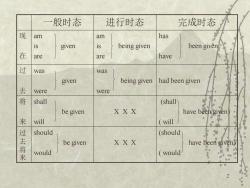
般时态 进行时态 完成时态 现 am am has given is being given been given 在 are are have 过 was was given being given had been given 去 were were 将 shall (shall be given XXX have been given) 来 will (will 过 should (should be given XXX have been given) 来 would would
2 一般时态 进行时态 完成时态 现 在 am is given are am is being given are has been given have 过 去 was given were was being given were had been given 将 来 shall be given will X X X (shall have been given) ( will 过 去 将 来 should be given would X X X (should have been given) ( would
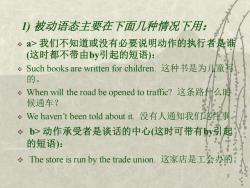
)被动语态主要在下面几种情况下用: a>我们不知道或没有必要说明动作的执行者是谁 (这时都不带由by引起的短语): Such books are written for children.这种书是为儿童写 的。 When will the road be opened to traffic?这条路t么时 候通车? We haven't been told about it..没有人通知我们这件事。 b>动作承受者是谈话的中心(这时可带有y引起 的短语): The store is run by the trade union.这家店是工会办的:
3 1) 被动语态主要在下面几种情况下用: ❖ a> 我们不知道或没有必要说明动作的执行者是谁 (这时都不带由by引起的短语): ❖ Such books are written for children. 这种书是为儿童写 的。 ❖ When will the road be opened to traffic? 这条路什么时 候通车? ❖ We haven’t been told about it. 没有人通知我们这件事。 ❖ b> 动作承受者是谈话的中心(这时可带有by引起 的短语): ❖ The store is run by the trade union. 这家店是工会办的
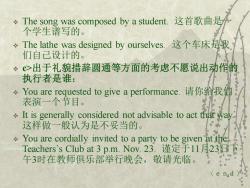
÷The song was composed by a student..这首歌曲是 个学生谱写的。 ÷The lathe was designed by ourselves.这个车床是饿 们自己设计的。 c>出于礼貌措辞圆通等方面的考虑不愿说出动作的 执行者是谁: You are requested to give a performance.请你给我 表演一个节目。 It is generally considered not advisable to act that way. 这样做一般认为是不妥当的。 You are cordially invited to a party to be given at the Teachers's Club at3p.m.Nov.23.谨定于11月23日下 午3时在教师俱乐部举行晚会,敬请光临。 en4d
4 ❖ The song was composed by a student. 这首歌曲是一 个学生谱写的。 ❖ The lathe was designed by ourselves. 这个车床是我 们自己设计的。 ❖ c>出于礼貌措辞圆通等方面的考虑不愿说出动作的 执行者是谁: ❖ You are requested to give a performance. 请你给我们 表演一个节目。 ❖ It is generally considered not advisable to act that way. 这样做一般认为是不妥当的。 ❖ You are cordially invited to a party to be given at the Teachers’s Club at 3 p.m. Nov. 23. 谨定于11月23日下 午3时在教师俱乐部举行晚会,敬请光临。 (end)
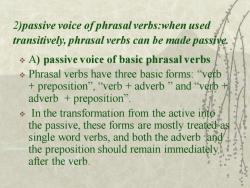
2)passive voice ofphrasal verbs:when used transitively,phrasal verbs can be made passive. A)passive voice of basic phrasal verbs Phrasal verbs have three basic forms:"verb +preposition”,“verb+adverb”and“verb adverb preposition". In the transformation from the active into the passive,these forms are mostly treated as single word verbs,and both the adverband the preposition should remain immediately. after the verb
5 2)passive voice of phrasal verbs:when used transitively, phrasal verbs can be made passive. ❖ A) passive voice of basic phrasal verbs ❖ Phrasal verbs have three basic forms: “verb + preposition”, “verb + adverb ” and “verb + adverb + preposition”. ❖ In the transformation from the active into the passive, these forms are mostly treated as single word verbs, and both the adverb and the preposition should remain immediately after the verb
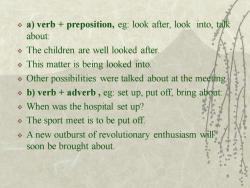
a)verb preposition,eg:look after,look into,talk about: The children are well looked after. This matter is being looked into. Other possibilities were talked about at the meeting. b)verb adverb,eg:set up,put off,bring about: When was the hospital set up? The sport meet is to be put off. A new outburst of revolutionary enthusiasm will soon be brought about
6 ❖ a) verb + preposition, eg: look after, look into, talk about: ❖ The children are well looked after. ❖ This matter is being looked into. ❖ Other possibilities were talked about at the meeting. ❖ b) verb + adverb , eg: set up, put off, bring about: ❖ When was the hospital set up? ❖ The sport meet is to be put off. ❖ A new outburst of revolutionary enthusiasm will soon be brought about
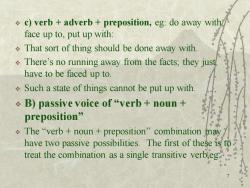
c)verb adverb+preposition,eg:do away with face up to,put up with: That sort of thing should be done away with There's no running away from the facts;they just have to be faced up to. Such a state of things cannot be put up with. B)passive voice of "verb+noun+ preposition” Theverb noun preposition"combination may have two passive possibilities.The first of these is to treat the combination as a single transitive verb,eg
7 ❖ c) verb + adverb + preposition, eg: do away with, face up to, put up with: ❖ That sort of thing should be done away with. ❖ There’s no running away from the facts; they just have to be faced up to. ❖ Such a state of things cannot be put up with. ❖ B) passive voice of “verb + noun + preposition” ❖ The “verb + noun + preposition” combination may have two passive possibilities. The first of these is to treat the combination as a single transitive verb,eg:
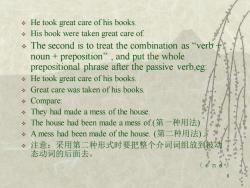
He took great care of his books His book were taken great care of. The second is to treat the combination as"verb noun preposition",and put the whole prepositional phrase after the passive verb,eg He took great care of his books. Great care was taken of his books. Compare: They had made a mess of the house The house had been made a mess of.(第一种用法) A mess had been made of the house.(第二种用法). 。注意:采用第二种形式时要把整个介词词组放到被动 态动词的后面去。 (e n d
8 ❖ He took great care of his books. ❖ His book were taken great care of. ❖ The second is to treat the combination as “verb + noun + preposition” , and put the whole prepositional phrase after the passive verb,eg: ❖ He took great care of his books. ❖ Great care was taken of his books. ❖ Compare: ❖ They had made a mess of the house. ❖ The house had been made a mess of.(第一种用法) ❖ A mess had been made of the house. (第二种用法) ❖ 注意:采用第二种形式时要把整个介词词组放到被动 态动词的后面去。 (end)
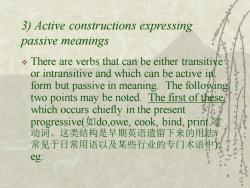
3)Active constructions expressing passive meanings There are verbs that can be either transitive? or intransitive and which can be active in form but passive in meaning.The following two points may be noted.The first of these which occurs chiefly in the present progressive(如do,owe,cook,bind,print.等 动词。这类结构是早期英语遗留下来的用法 常见于日常用语以及某些行业的专门术语中), eg:
9 3) Active constructions expressing passive meanings ❖ There are verbs that can be either transitive or intransitive and which can be active in form but passive in meaning. The following two points may be noted. The first of these, which occurs chiefly in the present progressive(如do,owe, cook, bind, print 等 动词。这类结构是早期英语遗留下来的用法, 常见于日常用语以及某些行业的专门术语中), eg:
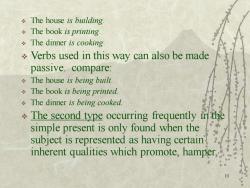
÷The house is building. ÷The book is printing. The dinner is cooking Verbs used in this way can also be made passive.compare: The house is being built. The book is being printed. The dinner is being cooked. *The second type occurring frequently in the simple present is only found when the subject is represented as having certain inherent qualities which promote,hamper
10 ❖ The house is building. ❖ The book is printing. ❖ The dinner is cooking. ❖ Verbs used in this way can also be made passive. compare: ❖ The house is being built. ❖ The book is being printed. ❖ The dinner is being cooked. ❖ The second type occurring frequently in the simple present is only found when the subject is represented as having certain inherent qualities which promote, hamper
按次数下载不扣除下载券;
注册用户24小时内重复下载只扣除一次;
顺序:VIP每日次数-->可用次数-->下载券;
- 《大学英语语法》课程电子教案(PPT课件)00 Introduction、The use of simple present.ppt
- 上海交通大学:《日语》课程教学资源(教学大纲)日本课程教学大纲汇编 Japanese Course Outline.pdf
- 吉林大学:《大学英语》课程电子教案(PPT课件)大学英语(一)第八单元(第66-72讲).ppt
- 吉林大学:《大学英语》课程电子教案(PPT课件)大学英语(一)第七单元(第58-65讲).ppt
- 吉林大学:《大学英语》课程电子教案(PPT课件)大学英语(一)第六单元(第50-57讲).ppt
- 吉林大学:《大学英语》课程电子教案(PPT课件)大学英语(一)第五单元(第42-49讲).ppt
- 吉林大学:《大学英语》课程电子教案(PPT课件)大学英语(一)第四单元(第34-41讲).ppt
- 吉林大学:《大学英语》课程电子教案(PPT课件)大学英语(一)第三单元(第25-33讲).ppt
- 吉林大学:《大学英语》课程电子教案(PPT课件)大学英语(一)第二单元(第13-24讲).ppt
- 吉林大学:《大学英语》课程电子教案(PPT课件)大学英语(一)第一单元(第1-12讲).ppt
- 上海海洋大学:外国语学院英语专业课程教学大纲汇编(2022年版).pdf
- 上海海洋大学:外国语学院日语专业课程教学大纲汇编(2022年版).pdf
- 上海海洋大学:外国语学院大学外语类课程教学大纲汇编(2022年版).pdf
- 上海海洋大学:外国语学院朝鲜语专业课程教学大纲汇编(2022年版).pdf
- 上海海洋大学:外语学院2018版课程教学大纲汇编(综合与通识教育课).pdf
- 上海海洋大学:外语学院2018版课程教学大纲汇编(专业实践课).pdf
- 上海海洋大学:外语学院2018版课程教学大纲汇编(专业理论课).pdf
- 上海海洋大学:外语学院2011年版课程教学大纲汇编(目录).pdf
- 上海海洋大学:外语学院2011年版课程教学大纲汇编(正文).pdf
- 吉林大学:《英语泛读》课程电子教案(PPT课件)Lesson 6 The Missing Five-Pound Note.ppt
- 《大学英语语法》课程电子教案(PPT课件)10 Revision、Sample.ppt
- 《大学英语语法》课程电子教案(PPT课件)02 完成时的用法、一般过去时与现在完成时的区别、时态的呼应.ppt
- 《大学英语语法》课程电子教案(PPT课件)03 非谓语动词(Non-finite forms).ppt
- 《大学英语语法》课程电子教案(PPT课件)04 虚拟语气(subjunctive mood)、情态动词(modal auxiliary).ppt
- 《大学英语语法》课程电子教案(PPT课件)05 名词(Noun)、形容词和副词(Adj.& Adv.)、冠词.ppt
- 《大学英语语法》课程电子教案(PPT课件)06 限定词(Determiners)、数词(numeral).ppt
- 《大学英语语法》课程电子教案(PPT课件)07 介词(preposition)、状语从句(Adverbial Clause)、定于从句(Attributive Clause)、名词性从句(Nominal Clauses)、主谓一致(Subject-verb Concord).ppt
- 《大学英语语法》课程电子教案(PPT课件)08 否定(Negation)、倒装(Inverted Order)、反意疑问句(tag question).ppt
- 《大学英语语法》课程电子教案(PPT课件)09 替代(substitution)、省略(Ellipsis)、It- 句型(“It” patterns)、直接引语和间接引语(Direct and Indirect Speech).ppt
- 吉林大学:《英语听说》课程电子教案(PPT课件)unit12 communuication..ppt
- 吉林大学:《英语听说》课程电子教案(PPT课件)unit13 family.ppt
- 吉林大学:《英语听说》课程电子教案(PPT课件)unit14 Transportation.ppt
- 吉林大学:《英语听说》课程电子教案(PPT课件)unit15 Service and economy.ppt
- 吉林大学:《英语听说》课程电子教案(PPT课件)unit18-19 UNIVERSITY LIFE.ppt
- 吉林大学:《英语听说》课程电子教案(PPT课件)unit20 Special English 1.ppt
- 吉林大学:《英语听说》课程电子教案(PPT课件)unit22 Special English.ppt
- 吉林大学:《英语听说》课程电子教案(PPT课件)unit23 Special English.ppt
- 吉林大学:《英语听说》课程电子教案(PPT课件)unit1-unit11(主讲人:董育英、寇晓虹).ppt
- 吉林大学:《英语听说》课程电子教案(PPT课件)unit16 At the Hotel 1.ppt
- 吉林大学:《英语听说》课程电子教案(PPT课件)unit21 Special English 2.ppt
